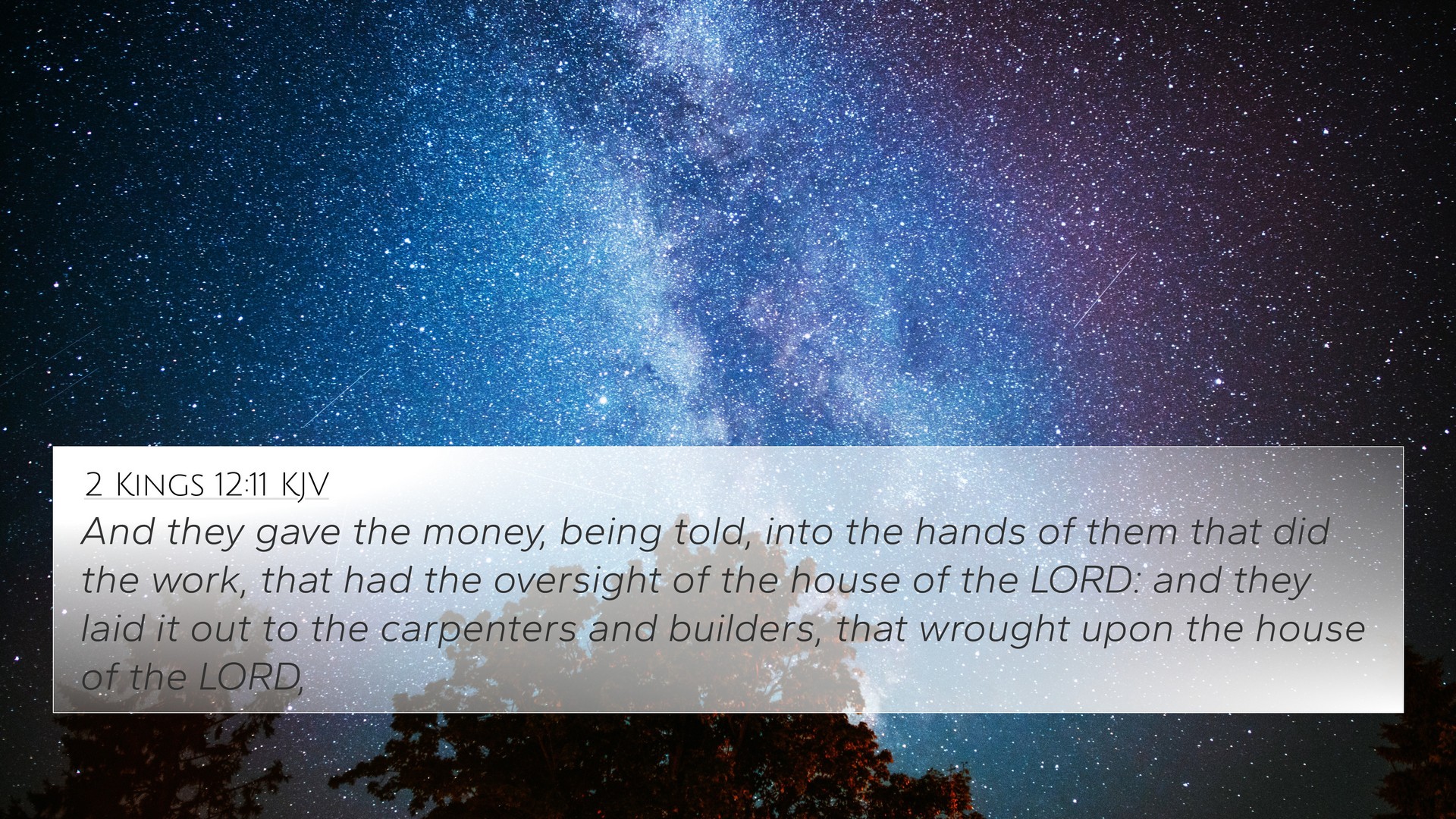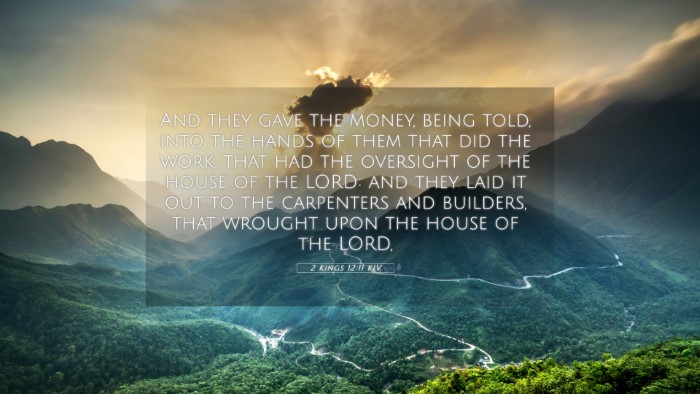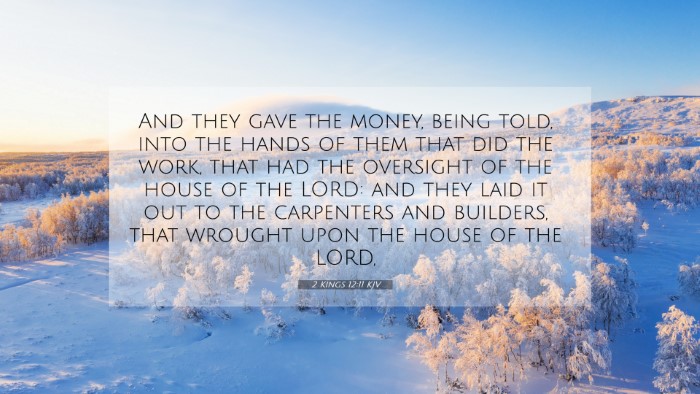Old Testament
Genesis Exodus Leviticus Numbers Deuteronomy Joshua Judges Ruth 1 Samuel 2 Samuel 1 Kings 2 Kings 1 Chronicles 2 Chronicles Ezra Nehemiah Esther Job Psalms Proverbs Ecclesiastes Song of Solomon Isaiah Jeremiah Lamentations Ezekiel Daniel Hosea Joel Amos Obadiah Jonah Micah Nahum Habakkuk Zephaniah Haggai Zechariah Malachi2 Kings 12:11 Similar Verses
2 Kings 12:11 Cross References
And they gave the money, being told, into the hands of them that did the work, that had the oversight of the house of the LORD: and they laid it out to the carpenters and builders, that wrought upon the house of the LORD,
Uncover the Rich Themes and Topics of This Bible Verse
Listed below are the Bible themes associated with 2 Kings 12:11. We invite you to explore each theme to gain deeper insights into the Scriptures.
2 Kings 12:11 Cross Reference Verses
This section features a detailed cross-reference designed to enrich your understanding of the Scriptures. Below, you will find carefully selected verses that echo the themes and teachings related to 2 Kings 12:11 KJV. Click on any image to explore detailed analyses of related Bible verses and uncover deeper theological insights.
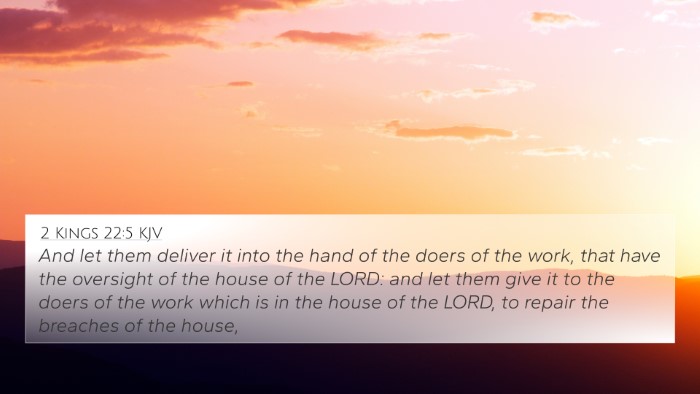
2 Kings 22:5 (KJV) »
And let them deliver it into the hand of the doers of the work, that have the oversight of the house of the LORD: and let them give it to the doers of the work which is in the house of the LORD, to repair the breaches of the house,
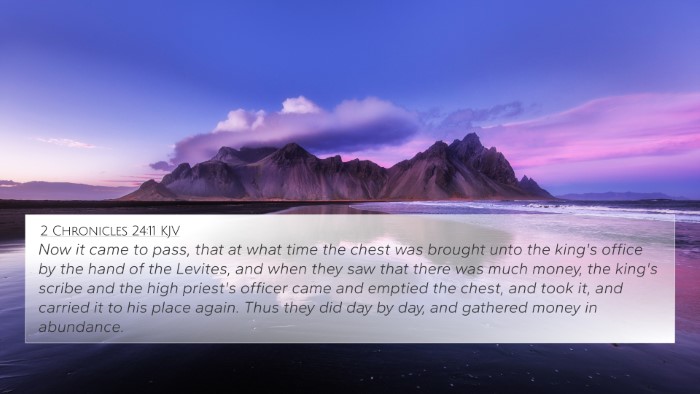
2 Chronicles 24:11 (KJV) »
Now it came to pass, that at what time the chest was brought unto the king's office by the hand of the Levites, and when they saw that there was much money, the king's scribe and the high priest's officer came and emptied the chest, and took it, and carried it to his place again. Thus they did day by day, and gathered money in abundance.
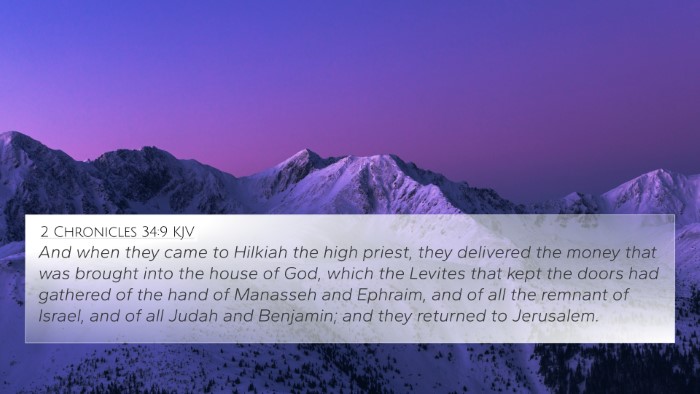
2 Chronicles 34:9 (KJV) »
And when they came to Hilkiah the high priest, they delivered the money that was brought into the house of God, which the Levites that kept the doors had gathered of the hand of Manasseh and Ephraim, and of all the remnant of Israel, and of all Judah and Benjamin; and they returned to Jerusalem.
2 Kings 12:11 Verse Analysis and Similar Verses
Understanding 2 Kings 12:11
Verse Reference: 2 Kings 12:11
This verse discusses the collection of money used for the repair and maintenance of the temple in Jerusalem during the reign of King Joash. The focus here is on the accountability of the priests in handling these funds.
Commentary Insights
Matthew Henry's Perspective: Matthew Henry observes that Joash was determined to repair the temple of the Lord, which had fallen into disrepair. He notes the significance of the temple as the dwelling place of God among His people. Joash appointed priests to oversee the collection and expenditure of funds, emphasizing the need for honesty and integrity in managing sacred resources.
Albert Barnes' Analysis: Albert Barnes highlights the practical aspects of this verse by indicating that the collection of money from the people was a communal effort to restore a significant spiritual and cultural landmark. He points out that the priests were entrusted with these funds, thus establishing a critical link between religious leadership and financial accountability. Barnes underscores that this act reflects the faithfulness of the people towards God's house and their willingness to contribute to its upkeep.
Adam Clarke's Remarks: Adam Clarke provides a detailed commentary by discussing the wider implications of this verse. He suggests that the temple restoration symbolizes a return to proper worship and alignment with God’s commands. Clarke also emphasizes the moral duty of religious leaders to ensure that funds are used appropriately for divine purposes, portraying the role of the priests not just as custodians of money but as stewards of God’s glory.
Bible Cross References
- 2 Chronicles 24:5 - Joash's command to collect money for temple repairs.
- Exodus 30:13-15 - Instructions regarding the half-shekel tax for the service of the sanctuary.
- Malachi 3:10 - A call to bring tithes into the storehouse for temple upkeep.
- Matthew 21:12 - Jesus cleansing the temple, indicating the importance of maintaining the sanctity of God’s house.
- Hebrews 3:6 - The contrast between Moses’ house and Christ’s, reflecting on stewardship in the house of God.
- 1 Chronicles 29:3-5 - David’s contributions to the temple, showing the longstanding importance of funding for worship.
- Nehemiah 10:39 - Assurance to support the maintenance of the house of God with the first fruits.
Thematic Connections and Insights
This passage allows us to explore several connecting themes in the Bible:
- Accountability in Ministry: Both this verse and others, such as 1 Timothy 5:17, emphasize the need for accountability among those who serve in ministry.
- God’s Presence in the Temple: The importance of the physical temple ties to God’s presence, echoed in verses like John 2:19-21, where Jesus speaks of His body as the temple.
- Community Involvement: The collective effort to fund the temple resonates with the call found in Acts 2:44-45 about believers sharing resources among themselves.
- The Value of Sacred Spaces: This reflects the frequent biblical theme that spiritual and communal spaces are worthy of investment, as seen in Genesis 28:16-17 where Jacob called the place he encountered God “the house of God.”
Conclusion
The verse 2 Kings 12:11 serves as a reminder of the importance of maintaining the sacred spaces where God is worshiped. It exemplifies the principle of stewardship within the community of believers and underscores the role of the church as a central place for worship and spiritual fellowship.
The act of collecting funds and ensuring accountabilities, as indicated by the commentaries, offers a portrayal of a healthy relationship between faith, community, and divine service that remains relevant even in contemporary church practices. By cross-referencing other biblical texts, we can better comprehend the rich tapestry woven throughout Scripture concerning the importance of such acts in fostering a vibrant spiritual life.
